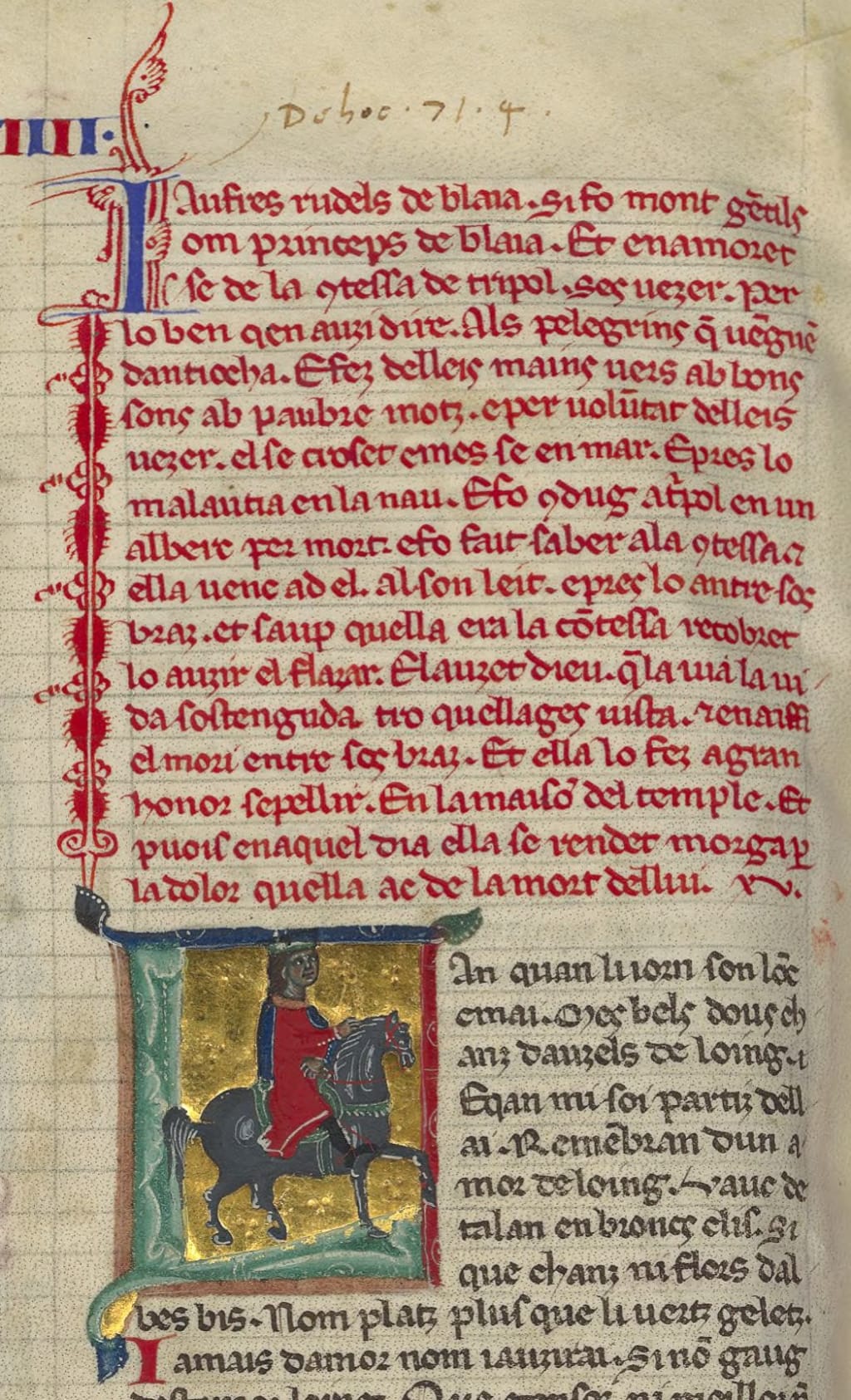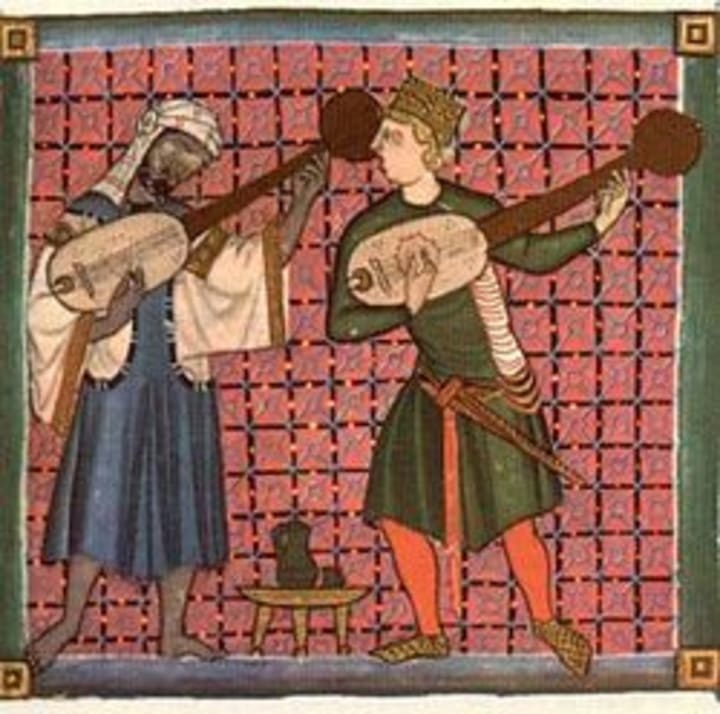Love Before First Sight
Jaufre Rudel and the Poetry of the Troubadours

This piece is part pastiche, part translation, and part original composition. It is intended to produce an impression on the English language reader of the beauty of the love poetry of the troubadours. This movement flourished in the south of France, between the twelfth and fourteenth centuries, in a language called Old Provençal or Old Occitane. Both poetry and prose will be used to render this.
TO MAKE IS TO FIND: the Craft
A "Troubadour" means a "Finder:"
of verses/ of poetic ideas/ of rhyme and rhythm schemes;
stemming from the verb
"trobar" in Old Provençal.
He can perform the role of "jogleur" and as such
juggles, or performs the bassa dansa
and other such entertainments, embracing
Arabian musical influence and
Celtic Lore.

Always seeking after hand-outs from Patrons,
playing to their tastes and passions,
just to have a bit of a bite to eat
[plz//: feed the jogleur!]
The Jogleur is the performer of verses and melodies composed by the Troubadour,
who transmits verses
on a sheet of parchment
or else by word of mouth
molded into melody.
The poem/song below was actually worked upon by at least two poet-musicians, the basis of the stanzas and melody written in the 1200's, stanzas were added and the music was further elaborated in the 1300's, showing a perfect fusion of the "Classic" and "Decadent" periods of Old Provençal poetry and music.
Giraut de Borneil and others: Non puesc sofrir.
LOVE FROM AFAR: The Legend of Jaufre Rudel
Jaufre Rudel was a renowned gentleman, Prince of Blaye, castellan in league with his cousin, the Count of Angouleme, in developing the cult of lyric poetry in the vernacular language. And this was a new thing; it was in the "Archaic" period of Troubadour verse, when it was just getting going. I mean, people were writing what could have been good poetry in bad church Latin, to awful effect.
All that was about to change, with Jaufre Rudel, Cercamon, Macabrun, and Guillaume IX of Aquitaine. Rivals. In fact, even though Jaufre was Prince of Blaye, he was dispossessed of his lands most cruelly by the warring actions of rival troubadour prince, Guillaume Duke of Aquitaine (grandfather of the famed queen Eleanor of Aquitaine, generous patroness of the troubadours and jogleurs herself).
Jaufre had to wander hopelessly almost helplessly until taken in by the Viscount of Ventadour, not for his titles, but for his skills in poetry.

He fell madly in love with the Countess Hodierne of Tripoli, without having seen her once: so great was her beauty and allure in the eyes of the pilgrims who had seen her first-hand, coming on their way from the ancient city of Antioch. Her wisdom was also much praised by them, and they told of how she was sought throughout the land for her advice.
Jaufre composed verses for her, set to fine melodies, but with awkward wording, his only gift from afar to his long-distance love. Fin'amor is a kind of courtesy and courtly love, perhaps only possible at a distance. Some say his impassioned devotion was not based in mere hearsay, but on a portrait that he possessed of the Countess, and that looking for so long at this picture of her, he could almost believe it was real.
Lanquan li jorn son lonc, en may,
[when the days are long, in may,]
M'es belhs dous chans d'auzelhs de lonh;
[the sweet song of the birds brings beauty to me;]
E quan mi suy partitz de lay,
[but when I have turned away from them,]
Remembra.m d'un amor de lonh;
[I remember me of a love from afar;]
Vau de talan embronx e clis,
[I go, with will darkened and bowed-down]
Si que chans ni flors d'abespis
[so that neither song nor whitethorn flower]
No.m valon plus qu'iverns gelatz.
[are worth more to me than frozen winter.]
Although his "cansos" or love-songs brought him fame far and wide, he longed to embark on his own pilgrimage to see her beauty and hear her wisdom himself. Out of this wish, he enlisted in a foolhardy crusade which would bring him through the city of Tripoli; and thus he set sail. He fell horribly ill, however, during a stormy and foreboding voyage; the ship dropped anchor in the port of Tripoli, and he was then brought to an inn. He felt the hour of his death approaching.
When it was made known to the Countess Hodierne what had befallen the poet who had written her from afar so many cansos, she went to him in the inn where he was bedridden. Coming to him, she took him in her arms, her long hair draped about his feverish brow.
He knew that it was She, so long awaited--and in reality, no longer a phantom of a dream in his songs. He immediately recovered his sense of sight and hearing, praising God for having preserved and sustained his life up until this moment, when he could finally see Her. It was thus with a contented sigh, that he gave up the ghost enfolded in her embrace.

The Countess had him buried in great honor, mourning him like a husband. The long-distance love he had penned from afar had spoiled her as to any other love or marriage, always either politically motivated or bodily-appropriative: only Jaufre's love had been unspoiled, and now he was gone.
Legend tells, the Countess Hodierne of Tripoli finally threw herself from a lofty parapet, ending a life in loss of the love she never knew she'd had until she'd lost it.
Other chroniclers say that she lived on, consecrating her energies and the wealth of her domains to the support of Troubadours, Jogleurs, and their mission to validate lyric poetry in the vernacular. I, personally, like that ending far better.
IN HONOR OF JAUFRE RUDEL
*
o love from far-off land
for you all my heart aches
and I can find no remedy
if not in your call
with the hard
bow-shot
of sweet love
within an orchard
or curtained chamber
beside
desired companion
*
when the days are long in may
birdsong from afar
brings beauty to me\
when the nightingale in the foliage
gives its love
and seeks and takes it
and moves by song
jubilant and joyous/
often gazing at its mate
my own song
is stimulated
to fly forth transmitted on parchment
to my Lady in far-off lands
by my friends from afar
*
when the days are short in February
the snowflakes seem to be inverted flowers
may no man marvel at me
that I love her who will never see me
knowing well I never had joy of her
and she will never have joy of me//:
she has never told me truth
but never lied to me
*
they do not know how to sing
who say no sound\
nor do they know how it goes with rhyme
if they don't get the reason/
but my own song begins
in such a way
that the more you hear it
the more it's worth
*
this song is good
for I never failed in it
and all that's in it is well in place://
without parchment brief
I send off these verses
which we sing
in plain romance tongue
may they who learn this song
not take it from me
to break it
or pull it into pieces
so thus it can be heard by
my friends in far-off lands
*
The are six extant poems written by the troubadour Jaufre Rudel, two of which have melodies which have survived. You can find all six cansos here, in the original and in English translation:
http://trobar.org/troubadours/jaufre_rudel/
More:
And:
About the Creator
Rob Angeli
sunt lacrimae rerum et mentem mortalia tangunt
There are tears of things, and mortal objects touch the mind.
-Virgil Aeneid I.462
Reader insights
Nice work
Very well written. Keep up the good work!
Top insights
Easy to read and follow
Well-structured & engaging content
Expert insights and opinions
Arguments were carefully researched and presented
Eye opening
Niche topic & fresh perspectives
Heartfelt and relatable
The story invoked strong personal emotions
On-point and relevant
Writing reflected the title & theme






Comments (3)
I love that the poem found you and you welcomed it and translated it. It captures nostalgia of passion requited. Wonderfully done.
Wonderful capture of the life of a troubadour. Deep and educational. And your homage to Jaufre is beautiful💙Anneliese
fantastic writing!